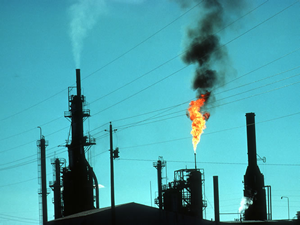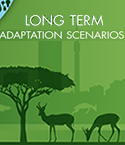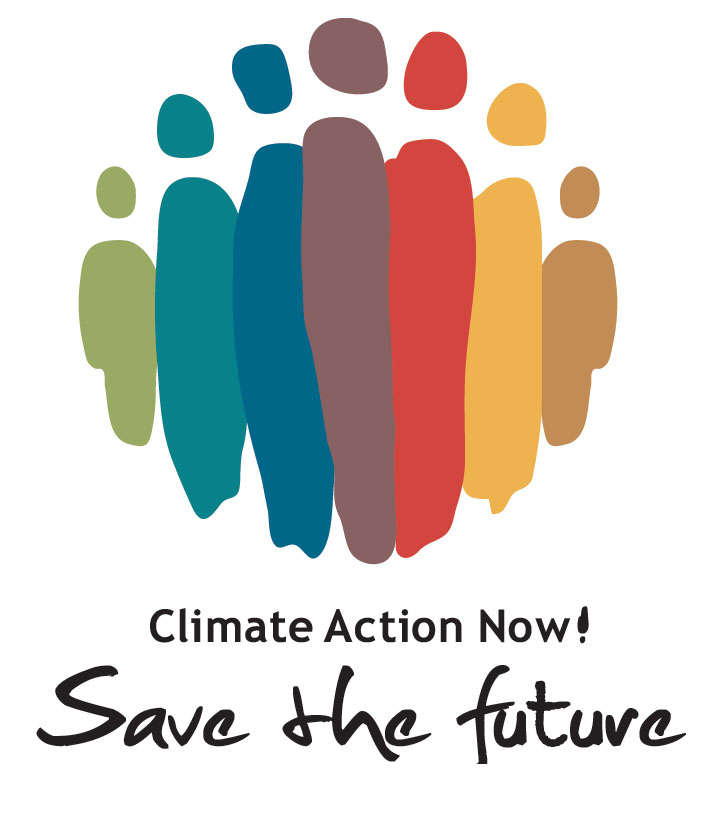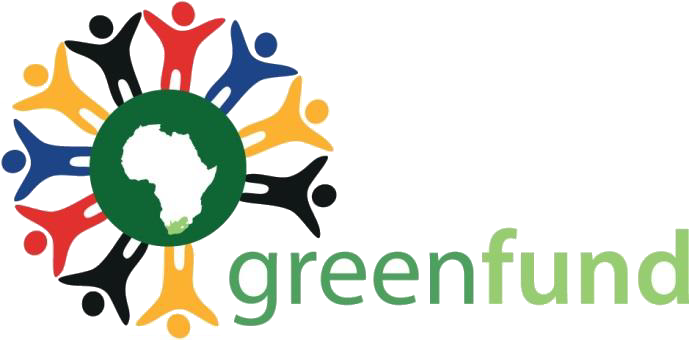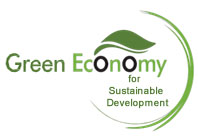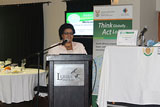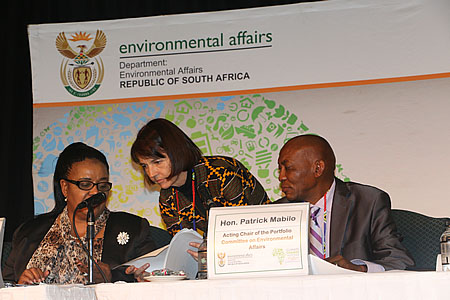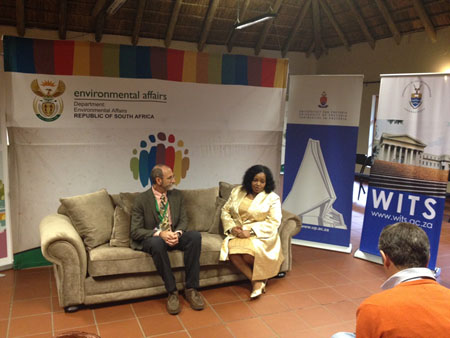Climate Change and Air Quality
Purpose and functions
Introduction and background
The phenomenon known as “climate change”, refers to an ongoing trend of changes in the earth’s general weather conditions as a result of an average rise in the temperature of the earth’s surface often referred to as global warming. This rise in the average global temperature is due, primarily, to the increased concentration of gases known as greenhouse gases (GHGs) in the atmosphere that are emitted by human activities. These gases intensify a natural phenomenon called the “greenhouse effect” by forming an insulating layer in the atmosphere that reduces the amount of the sun’s heat that radiates back into space and therefore has the effect of making the earth warmer.
While weather changes on a daily basis, climate represents the statistical distribution of weather patterns over time, and on a global scale has changed only very slowly in the past – usually over periods of tens of thousands of years or even millions of years which allows time for the earth’s bio-physical systems to adapt naturally to the changing climatic conditions. Currently, the global climate is changing much more rapidly as a result of global warming, leading to, among others, the melting of polar and glacier ice, sea-level rise, ocean acidification, changes in rainfall and snowfall patterns, more frequent floods and droughts and increased frequency and intensity of extreme weather events, such as tornadoes, hurricanes and cyclones.
The rapid rate of this climate change does not allow the earth’s bio-physical systems to adapt to these changes naturally.
Factories like these are a major source of air pollution.
This background information was taken from an introduction of the National Climate Change Response White Paper.
Purpose
To improve air and atmospheric quality, lead and support, inform, monitor and report efficient and effective international, national and significant provincial and local responses to climate change.
Functions
- To identify, gather, sort, collate, store, archive, analyse, synthesize, distribute and popularise complete, accurate, and current climate change and climate change response data and information that ensures informed climate change response decision-making.
- To lead and/or support, inform, monitor and report efficient and effective national, provincial and local climate change mitigation responses.
- To lead and/or support, inform, monitor and report efficient and effective national, provincial and local climate change adaptation responses.
- To prepare for, negotiate and inform the implementation of multi-lateral, mini-lateral and bilateral climate change agreements.
- To ensure that reasonable legislative and other measures are developed, implemented and maintained in such a way as to protect and defend the right of all to air and atmospheric quality that is not harmful to health and well-being.
Structure and contact details
Acting Deputy Director-General Climate Change and Air Quality Management: Peter Lukey
Telephone :
Fax :
E-mail:
Chief Directorate - Climate Change Monitoring and Evaluation: Mr Jongikhaya Witi
Chief Directorate - Climate Change Mitigation:
Chief Directorate - Climate Change Adaptation: Mr Tlou Ramaru
Chief Directorate - International Climate Change Relations and Negotiations:
Mr Maesela Kekana
Chief Directorate - Air Quality
Management
Chief Directorate - International Governance and Resource Mobilization: Mr Zaheer Fakir
Chief Directorate - Knowledge and Information Management: Mr Peter Lukey
Related projects / programmes categories
The Long-Term Adaptation Flagship Research Programme (LTAS)
The Long-Term Adaptation Flagship Research Programme (LTAS) responds to the South African National Climate Change Response White Paper by undertaking climate change adaptation research and scenario planning for South Africa and the Southern African sub-region. The Department of Environmental Affairs (DEA) is leading the process in collaboration with technical research partner the South African National Biodiversity Institute (SANBI) as well as technical and financial assistance from the Gesellschaft für Internationale Zusammenarbeit (GIZ).
Phase 2 of the Long-Term Adaptation Flagship Research Programm include the following:
- Climate Change Adaptation Perspectives for the South African Development Community (SADC)
- Climate Information and early warning systems for supporting the Disaster Risk Reduction and Management Sector in South Africa under Future Climates
- Climate Change Adaptation Perspectives for Disaster Risk Reduction and Management in South Africa
- Climate Change Adaptation Perspectives on Urban, Rural, and Coastal Human Settlements in South Africa
- Climate Change Adaptation Perspectives on Food Security in South Africa
- Climate Change Adaptation Perspectives to future Climates in South Africa
- Long Term Adaptation Scenarios for South Africa
Phase 1 of the Long-Term Adaptation Scenarios include the following:
- Climate Change Implications for the Agriculture and Forestry Sectors in South Africa
- Climate Change Implications for the Biodiversity Sector in South Africa
- Climate Trends and Scenarios for South Africa
- Climate Change Implications for Human Health in South Africa
- Climate Change Implications for Marine Fisheries in South Africa
- Summary for Policy-Makers
- Climate Change Implications for the Water Sector in South Africa
Climate Action Now!
The objectives of the campaign are to:
- Build awareness of the causes and effects of climate change
- Mobilise South African businesses, households and stakeholders to take action on climate change.
- The campaign aims to unite government, business, labour, and civil society to save the future by taking action on climate change now.
read more...
Green Fund
The Government of South Africa through the Department of Environmental Affairs (DEA) has set up a Green Fund to support the transition to a low carbon, resource efficient and climate resilient development path delivering high impact economic, environmental and social benefits. This section of the website provides pages on: About the Fund, funding windows, eligibility criteria, institutional requirements, project phases and related publication.
read more...
Green Economy
In this section of the website will find pages on: About Green Economy, programme guides page contains information pertaining to the National Greening Framework documents spanning to the 2010 World Cup greening initiatives to current. Resource page provides documents such as NSSD, Green Economy Modelling Report and other documents relevant / related to the subject.
read more...
Donor Funded projects
The Branch: Environmental Advisory Services interacts with donors interested in assisting South Africa to address environmental as well as climate change challenges. In this section of the website you will find the following pages: About Donor Funded projects, the fund categories available within the multilateral and bilateral agreements and info on structure of the programmes / projects.
read more...
Related events with media products
Presentations
CoP 21 breakfast session
The Minister of Environmental Affairs, Mrs Edna Molewa, will host an interactive multi-stakeholder breakfast engagement in preparation for South Africa’s participation in the 21st Conference of Parties to the United Nations Framework Convention on Climate Change in Paris.
The international climate change talks, to be held from 30 November to 11 December 2015, are expected to be the culmination of a four-year negotiation process that was initiated in Durban at CoP17 in 2011.
>> Speech: Minister Molewa’s speech during climate change talks, CoP 21 breakfast session
>> Mr Makhubele's talking points for the climate change breakfast session
2014 National Climate Change Response Dialogue
The Department of Environmental Affairs (DEA), in collaboration with the Inter-Governmental Committee on Climate Change (IGCCC) organised a four day national dialogue and conference on South Africa’s National Climate Change Response, focusing on implementation. Titled: “South Africa is transitioning to a lower carbon and climate resilient economy and society".
read more...
2013 IPCC SREX Regional Outreach Meeting
The SREX Regional Outreach Event is part of a series of initiatives aimed at disseminating “The IPCC Special Report on Managing the Risks of Extreme Events and Disasters to Advance Climate Change Adaptation” (SREX) in Southern Africa and promoting dialogue among a wide range of stakeholders on the implication of the report for the region.
read more...
2013 Inter-Governmental Committee on Climate Change - Workshop
The workshop provided an opportunity for information-sharing with a broader range of stakeholders. It was also an opportunity to engage with the climate change programmes that are being implemented at the provincial and local levels.
read more...
Related media products
This section of the website provides image galleries related to international issues that the department has engaged on. These include the various Conferences of Parties, BASIC meetings, ceremonies to mark signing of cooperation agreements among others.
read more...
Partners and links
| Climate change international governance |
| Advocacy, awareness, outreach and environmental rights |
| Business and organised labour |
|
| Scientific and research community |
| National and provincial government |
| Local government |
| Climate change mitigation |
| Climate change adaptation |
| Air quality management |


